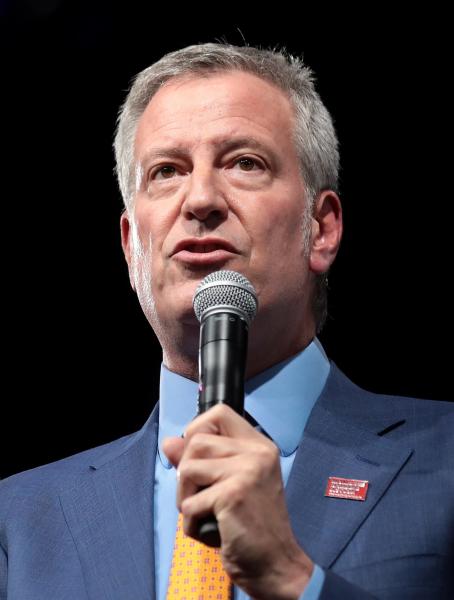Are you an adult capable of making informed decisions to protect your health? If you live in New York City, the answer is “no.” That's because NYC is all but requiring its residents to get a COVID-19 vaccine. “New York City Mayor Bill de Blasio mandated inoculations for a range of indoor venues at a news conference,” CNBC reported on August 3, “requiring proof of Covid vaccinations from employees and customers of indoor eateries, gyms and entertainment centers.”
The authorized COVID-19 vaccines are safe for the vast majority of people and remarkably effective; their rapid development is a testament to the capabilities of modern science. My wife and son got one, and so did I. That said, mandating people get the shots is unhelpful at best and counterproductive at worst.
Mandates won't bring back normal life
If you think mandates are the way back to normalcy, a world free of COVID mitigation measures, you're mistaken. Yes, the vaccines stem SARS-COV-2 spread, hospitalization and death, but governments don't always “follow the science.” Despite remarkable vaccine efficacy, the CDC has once again recommended that fully immunized individuals mask up under certain circumstances. Whatever motivated the agency's decision, it certainly wasn't evidence. Let's be generous and call it an “abundance of caution.”
New York city's leadership is suffering from the same paranoia that has infected the CDC. While NYC COVID-19 cases have rebounded to a certain extent, they're still significantly below the city's January 2021 peak. Moreover, hospitalizations and deaths have plummeted in recent months. These outcomes are the predictable results of infection- and vaccine-induced immunity. More than 800,000 people have been infected and 55 percent of all NYC residents (more than 4.5 million people) are fully vaccinated.
Those aren't perfect numbers, but they do suggest that immunity to the virus is relatively widespread across the city, as de Blasio himself acknowledged. “The only reason we’re having this recovery is vaccination,” he told reporters—and yet he mandated the shots anyway. When we give politicians the authority to dictate intimate aspects of our lives, don't be surprised that they exercise it.
A gift to vaccine skeptics
Most importantly, mandates play into the vaccines-are-useless-narrative championed by skeptics. “The purpose here is discrimination, not health,” investigative journalist Jordan Schachtel tweeted to 131,000 followers. “They want to exclude people from society that they label as inferior. If the vax works, this is unecessary [sic]. If the vax doesn't work, this is pointless. The policy is segregation, plain and simple.”
Schachtel is wrong about the vaccines. There is no doubt that they're effective, but it's also well known that the more widespread immunization is, the fewer cases we'll see. As infectious disease expert Paul Offit has pointed out, a vaccinated person surrounded by unvaccinated neighbors is more likely to get sick than an unvaccinated individual in a mostly vaccinated community.
However, by forcing the shots on people, we clear the way for commentators like Schachtel, Alex Berenson, and other high-profile iconoclasts to plausibly argue that the vaccines don't work. This is especially true when so many people have already volunteered to roll up their sleeves.
Now, what about those who are unsure about the shots, presumably the targets of vaccine mandates? The research is clear on this issue. People don't like their hands being forced. As I wrote in April:
Forcing people to get particular vaccines may decrease their willingness to get other shots that aren't mandated. According to a 2015 study conducted in Germany: '[I]f individuals feel constricted, i.e. because they have a negative attitude towards vaccination and did not intrinsically intend to vaccinate, they will reassert their freedom of choice by refusing vaccination on the next possible occasion.
Thus, paradoxically, the introduction of partial compulsory vaccination can backfire especially there where it is needed most: among people who have a negative attitude towards vaccination.'
Competing priorities
We live in a world of competing priorities. Most people are sensible enough to take precautions against getting sick; indeed, nearly 60 percent of Americans over 12 are fully immunized against COVID-19. But avoiding disease isn't all individuals care about, and the value they place on specific health outcomes relative to other goals they have varies from person to person. As the economist Ludwig von Mises explained in 1949:
From his point of view the physiologist is right in distinguishing between sensible action and action contrary to purpose. He is right in contrasting judicious methods of nourishment from unwise methods. He may condemn certain modes of behavior as absurd and opposed to 'real' needs.
However, such judgments are beside the point … Hygiene may be right or wrong in calling alcohol and nicotine poisons. But economics must explain the prices of tobacco and liquor as they are, not as they would be under different conditions (p 96)
We're not concerned with prices in this case, but the point is clear. We have to deal with people where they're at, not where we'd like them to be. Until public health experts and science communicators learn to embrace this fundamental fact about human nature, we will never put down vaccine skepticism.




